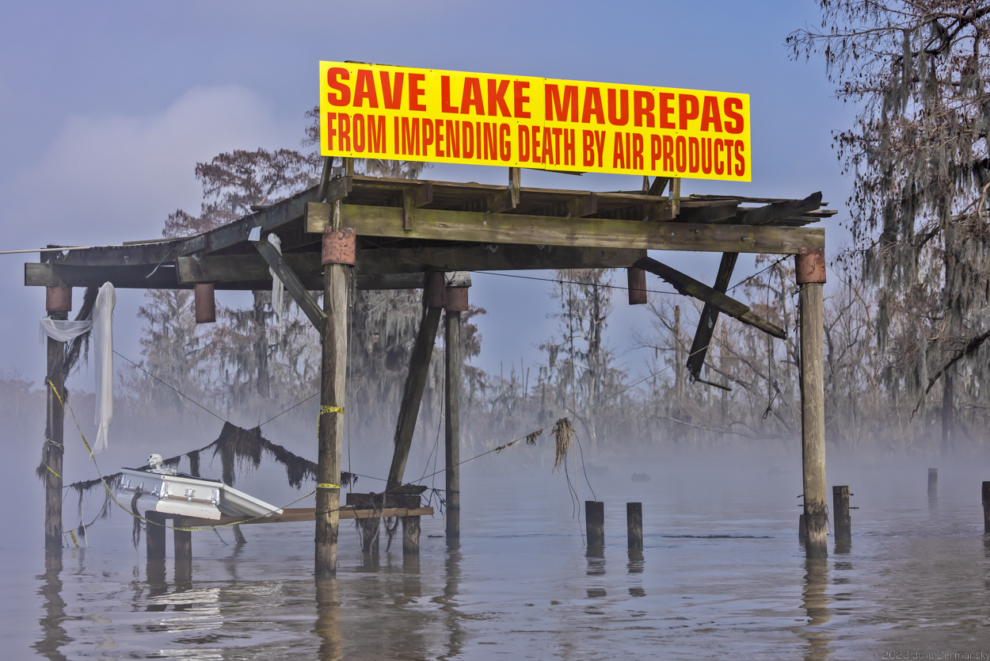It has become perhaps the most controversial environmental issue in southeast Louisiana. The residents who oppose a plan to let heavy industry use Lake Maurepas as a storage site for carbon dioxide emissions span the spectrum of race, class, age, education level and political affiliation.
Chemical giant Air Products wants to drill wells in Lake Maurepas to inject 5 million tons of carbon dioxide per year about a mile below the lakebed. It’s part of a $4.5 billion hydrogen manufacturing complex in adjacent Ascension Parish that would use carbon capture and sequestration (CCS) technology to pipe air pollution under the lake rather than release it into the atmosphere.
If successful, the project would allow Air Products to produce “blue hydrogen,” a cleaner alternative to natural gas and other fossil fuels that petrochemical manufacturers burn to make their products. It’s also cleaner than the common production of hydrogen fuel, called “gray hydrogen,” which is derived from natural gas in a chemical process that emits large amounts of methane, a potent greenhouse gas.
Blue hydrogen production relies on carbon capture technology to trap and store the carbon waste deep underground. “Green hydrogen” is considered the cleanest form and is produced through electrolysis powered by renewable energy sources such as solar or wind. All three fuels are chemically the same and differ only in how they are produced.
An increasing number of residents in Tangipahoa, Livingston and St. John the Baptist parishes see the Air Products project as little more than profiteering and reckless industrialization of an iconic lake they say has only recently begun to recover after generations of ecological destruction.
Kim Coates, who lives in Tangipahoa Parish, has been strongly opposed to the project and made it one of the central issues in her recent campaign for the District 73 seat in the Louisiana House of Representatives, which she won. In an interview Thursday, she said Air Products’ Lake Maurepas project is just about the most universally hated idea in southeast Louisiana.
Taxpayers have invested millions into restoring Lake Maurepas’ ecosystem, and some of those efforts have so far proven successful, she said.
The greater Lake Pontchartrain Basin, which includes Lake Pontchartrain and Lake Maurepas, is one of the largest estuaries and home to one of the largest contiguous forests in the country. But its fragile ecosystem has suffered from human activities such as oil and gas exploration, logging, levees along the Mississippi River, and the introduction of invasive species, according to studies from the Nature Conservancy and the Southeast Louisiana University Wetlands Restoration Laboratory, among others.
Some recovery efforts began in the 1990s, including a drilling moratorium in Lake Pontchartrain and a prohibition on dredging in both lakes. More recently, the Lake Pontchartrain Basin Restoration Program is a federal initiative that received $10 million in annual funding from President Joe Biden’s 2021 Bipartisan Infrastructure Law
“We’ve put millions and millions of dollars into restoration to protect that ecosystem, and you’re gonna turn around and undo it?” Coates said.
Other area residents have voiced similar sentiments at public meetings throughout the year, most recently Wednesday at the latest hearing of the Louisiana Senate’s Task Force on Local Impacts of Carbon Capture and Sequestration. The panel is charged with gathering information and making legislative recommendations to lawmakers.
Laurie Sagnibene, a Baton Rouge resident with a house on the Tickfaw River, which drains into Lake Maurepas, was one of many who voiced opposition to the project.
“Air Products claims they want to be a good neighbor, protect the lake,” Sagnibene said. “If you want to protect the lake, leave it alone.”
Several expressed concern over the risks and uncertainties surrounding CO2 pipelines and CCS technologies that remain largely untested at large scale. Those same concerns are shared among the scientific and environmental communities.
Such projects can be very costly and have resulted in dangerous accidents such as the Feb. 22, 2020, explosion of a CO2 pipeline in Satartia, Mississippi. The incident led to a mass poisoningthat hospitalized at least 45 residents and forced more than 200 to evacuate the small rural community.
Several residents referred to the Satartia incident when they addressed the task force. They pointed out how the first responders also became victims when they tried to drive into the area and were stranded because the large carbon dioxide cloud deprived their emergency vehicles of oxygen critical to the operation of combustion engines. Some struggled to breath and passed out.
Springfield resident Mindy Starkey has a family camp about 500 yards from Lake Maurepas.
“What happens when there’s a malfunction, an explosion?” she said. “What happens to me and my grandchildren when we’re down at our camp?”
Others are not strictly opposed to CCS and are more worried about property values and the general environmental impacts to the lake.
“We’re not against carbon capture statewide, but we are against it in Lake Maurepas,” said Bill Whittington, founder of the Lake Maurepas Preservation Society.
Many of the residents pointed out that the only support for the project has come from lobbyists and people who have a vested financial interest in it. Ahead of this year’s regular legislative session, Air Products hired 25 lobbyists to help secure its project and fend off any adverse legislation — a campaign that paid off. Every bill that tried to halt or slow down the Lake Maurepas project failed to gain traction.
The company also hired Gov. John Bel Edwards’ former spokesperson, Christina Stephens. The outgoing governor has been a vocal proponent of carbon capture as a key vehicle to reach his goal to make Louisiana a carbon neutral state by 2050.
Gifford Briggs, Gulf Coast region director for the American Petroleum Institute, told the Illuminator any characterization of carbon capture as a “new technology” is a false narrative. It has been used for several years, with only the storage component being a relatively recent development, he said.
Despite increasing public opposition, Air Products’ Lake Maurepas proposal has so far sailed smoothly through the state’s regulatory hurdles. The company has brought drilling rigs into the lake to drill test wells after conducting controversial seismic testing earlier this year.
Carbon capture has powerful backers such as the Louisiana Association of Business and Industry, one of the most influential lobby groups in the state. Big oil and industrial companies see the technology as a possible lifeline during the energy transition. A spokesperson for Gov.-elect Jeff Landry declined to offer any insights on Landry’s opinion of the project, although he said last month that efforts to achieve carbon neutral status in Louisiana shouldn’t be at the expense of oil and gas industry progress.
State Rep. Valarie Hodges, R-Denham Springs, also attended Wednesday’s task force meeting. She said Air Products should try to relocate its project somewhere else in Louisiana where it will have a lesser impact on the environment and people. Hodges won election to the Louisiana Senate in October.
“We’re asking: Can these companies — Oxy and Air Products — consider a different location that does not have such a dramatic impact on our way of life?” Hodges said.
When several residents expressed despair over state regulators ignoring or dismissing their concerns, Hodges reassured them the task force is listening and will have significant influence with the legislature.
The resolution that formed the task force touts the “massive” economic potential of CCS and notes that “Louisiana is blessed with a world-class volume of available pore space for storage … ideally positioning the state for development of the CCS sector into the future.” Sen. Heather Cloud, R-Turkey Creek, authored the resolution that claims CCS would help “improve the state’s environment.”
So far, opposition from neighbors has not prompted Air Products to change its Lake Maurepas plans or consider moving to a new area. Air Products plans to apply for another drilling permit in the coming months if its test well data indicates pore space below the lake is suitable for storing CO2, spokesperson Stephens said.
“We remain committed to the Lake Maurepas community and to ongoing outreach and education with the public, residents and local officials,” Stephens said.
She also touted the company’s recently launched Lake Maurepas Community Fund, an annual commitment of $1 million to fund community projects while its CCS project is in operation. Air Products anticipates using the site for at least 25 years. The company has also funded $9.9 million in research at Southeastern Louisiana University, which has launched the Lake Maurepas Monitoring Project to monitor its health, Stephens said.
Source: Louisiana Illuminator
















